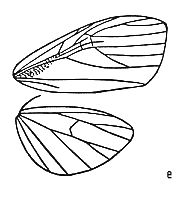|
Macotasa
Moore
Type
species: biplagella Butler, Borneo.
This
genus was redefined and revised by Holloway (1982). There are several diagnostic
features of the facies, where there is marked sexual dimorphism, and of the male
genitalia. A fold in the cell on the male forewing ridges the dorsal surface,
the basal part of this ridge being covered by an area of coarse scales from the
costa to just beyond the ridge. There is a blackish mark extending from the
central arching of the costa to the distal end of the ridge (fig 2e).

Fig 2e: Macotasa
tortricoides Walker
A curved
groove runs from the cell towards the margin just anterior to the tornus. The
females lack these structural modifications though they usually have a black costal
mark and diffuse blackish shading elsewhere on the forewing.
The
male genitalia are characterised by trifid valves and a furcate juxta as
described by Holloway (1982) and illustrated here. The triple structure of the
valves is somewhat modified in the last species discussed below. The uncus can
be bifid or entire.
The
female genitalia are varied but tend to have a pyriform corpus bursae that has a
small scobinate signum.
The
genus is restricted to the Oriental tropics.
<<Back
>>Forward <<Return
to Contents page
|

